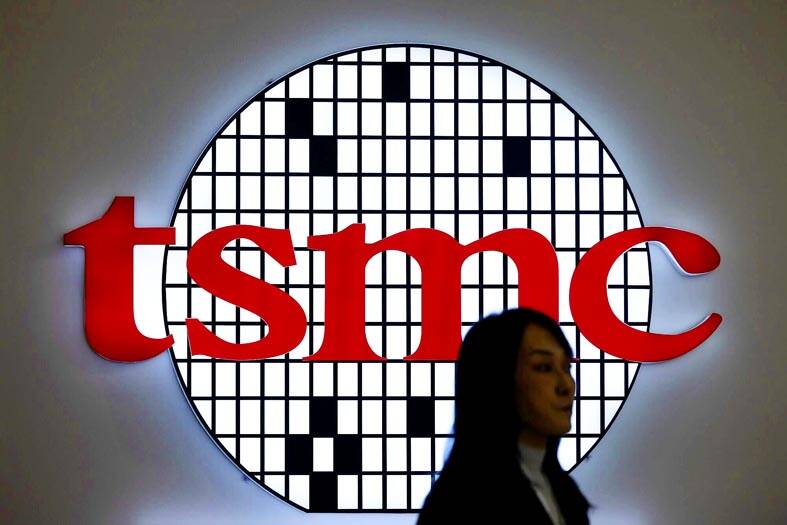Taiwan Semiconductor Manufacturing Co (TSMC, 台積電) yesterday said it would not comment on any pending legal action after more than a dozen current and former US employees filed a class action lawsuit accusing the chipmaker of discriminatory hiring practices.
Initially filed in August, the suit was refiled last week as a class action case with 13 plaintiffs named.
The 13 plaintiffs — whose backgrounds include the US, Mexico, Nigeria, Europe and South Korea — were seeking damages to redress TSMC’s apparent discrimination practices.

Photo: Bloomberg
In the lawsuit, the plaintiffs claimed TSMC’s employment practices include an “intentional pattern and practice of employment discrimination against individuals who are not of East Asian race, not of Taiwanese or Chinese national origin, and who are not citizens of Taiwan or China, including discrimination in hiring, staffing, promotion, and retention/termination decisions.”
While declining to comment on the lawsuit, TSMC did say that recruitment and promotion in the company did not take into account factors such as nationality and race.
“TSMC believes strongly in the value of a diverse workforce and we hire and promote without regard to gender, religion, race, nationality, or political affiliation because we respect differences, and believe that equal employment opportunities strengthen our competitiveness,” the company said.
“We also provide various channels for employees to raise concerns, and strive to address concerns constructively,” it said.
In Arizona, TSMC is building two advanced fabs, with the first scheduled to start mass production early next year, using the sophisticated 4-nanometer process, while the second is slated to mass produce wafers using the 3-nanometer and 2-nanometer processes in 2028 to tap into solid demand for artificial intelligence applications.
TSMC has announced a plan to build a third fab in Arizona using the 2-nanometer process or more advanced technology, with production slated to start by the end of 2030, boosting its total investment in Arizona to top US$65 billion.

TECH CLUSTER: The US company’s new office is in the Shalun Smart Green Energy Science City, a new AI industry base and cybersecurity hub in southern Taiwan US chip designer Advanced Micro Devices Inc (AMD) yesterday launched an office in Tainan’s Gueiren District (歸仁), marking a significant milestone in the development of southern Taiwan’s artificial intelligence (AI) industry, the Tainan City Government said in a statement. AMD Taiwan general manager Vincent Chern (陳民皓) presided over the opening ceremony for the company’s new office at the Shalun Smart Green Energy Science City (沙崙智慧綠能科學城), a new AI industry base and cybersecurity hub in southern Taiwan. Facilities in the new office include an information processing center, and a research and development (R&D) center, the Tainan Economic Development Bureau said. The Ministry

ADVERSARIES: The new list includes 11 entities in China and one in Taiwan, which is a local branch of Chinese cloud computing firm Inspur Group The US added dozens of entities to a trade blacklist on Tuesday, the US Department of Commerce said, in part to disrupt Beijing’s artificial intelligence (AI) and advanced computing capabilities. The action affects 80 entities from countries including China, the United Arab Emirates and Iran, with the commerce department citing their “activities contrary to US national security and foreign policy.” Those added to the “entity list” are restricted from obtaining US items and technologies without government authorization. “We will not allow adversaries to exploit American technology to bolster their own militaries and threaten American lives,” US Secretary of Commerce Howard Lutnick said. The entities

Minister of Finance Chuang Tsui-yun (莊翠雲) yesterday told lawmakers that she “would not speculate,” but a “response plan” has been prepared in case Taiwan is targeted by US President Donald Trump’s reciprocal tariffs, which are to be announced on Wednesday next week. The Trump administration, including US Secretary of the Treasury Scott Bessent, has said that much of the proposed reciprocal tariffs would focus on the 15 countries that have the highest trade surpluses with the US. Bessent has referred to those countries as the “dirty 15,” but has not named them. Last year, Taiwan’s US$73.9 billion trade surplus with the US

The Taipei International Cycle Show (Taipei Cycle) yesterday opened at the Taipei Nangang Exhibition Center, with the event’s organizer expecting a steady recovery in the industry this year following a tough last year. This year, 980 companies from 35 countries are participating in the annual bicycle trade show, showcasing technological breakthroughs and market development trends of the bicycle industry at 3,600 booths, the Taiwan External Trade Development Council (TAITRA, 外貿協會) said in a statement. Under the theme “Ride the Revolution,” the exhibition has attracted more than 3,500 international buyers from 80 countries to preregister for the four-day event, which is expected to